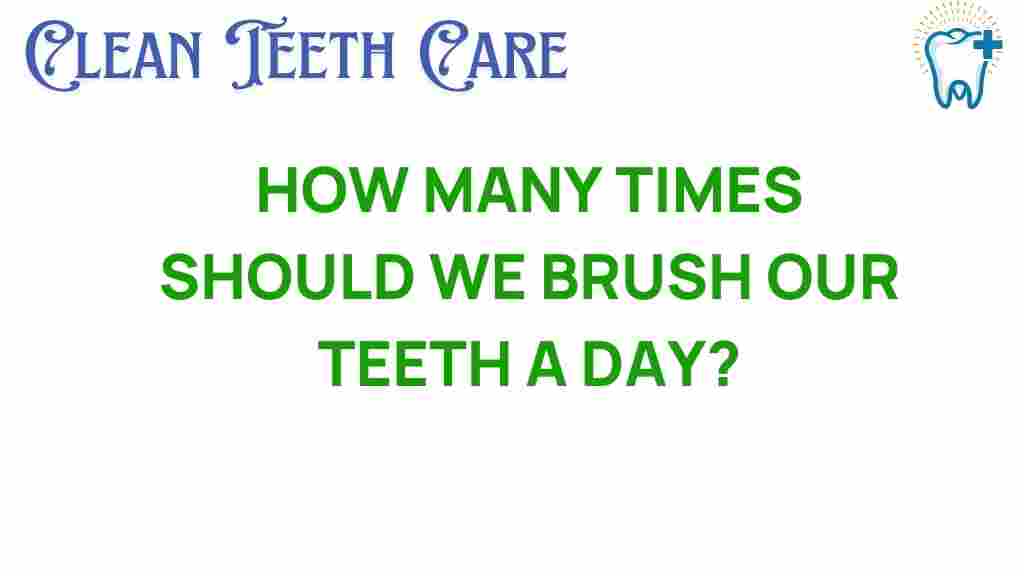The Daily Debate: How Many Times Should We Brush Our Teeth? – Focus on Dental Hygiene
Maintaining good dental hygiene is essential for overall oral health. One of the most debated topics in dental care is the frequency of brushing teeth. While most people agree that brushing is important, the question remains: how many times a day should we actually brush our teeth? In this article, we will explore expert advice on brushing teeth, the benefits of a consistent daily routine, and how proper dental hygiene can prevent cavities and gum disease.
Understanding Dental Hygiene
Dental hygiene refers to the practice of keeping the mouth, teeth, and gums clean and healthy. This involves regular brushing, flossing, and visiting the dentist for check-ups. Good oral health is crucial not only for a bright smile but also for overall health. Poor dental hygiene can lead to serious issues, including:
- Cavities
- Gum disease
- Bad breath
- Tooth loss
To effectively maintain dental hygiene, it is essential to establish a daily routine that includes brushing teeth at the right frequency and using the correct techniques.
The Importance of Brushing Teeth
Brushing teeth is a fundamental aspect of dental hygiene. It helps to remove food particles, plaque, and bacteria that can lead to oral health issues. Here are some reasons why brushing teeth is crucial:
- Prevention of Cavities: Brushing teeth at least twice a day helps to prevent the accumulation of plaque, which can lead to cavities.
- Reduction of Gum Disease: Regular brushing reduces the risk of gum disease by preventing plaque from hardening into tartar.
- Fresh Breath: Consistent brushing keeps your breath fresh by removing bacteria that cause bad breath.
- Overall Health: Good oral health is linked to overall health; poor dental hygiene can contribute to conditions such as heart disease.
Expert Advice: How Many Times Should We Brush Our Teeth?
The general consensus among dental experts is that you should brush your teeth at least twice a day. However, there are nuances to this guideline:
- Morning Routine: Brushing teeth in the morning helps to remove plaque that has built up overnight and freshens your breath for the day ahead.
- Evening Routine: Brushing at night is equally important as it removes food particles and plaque collected throughout the day.
- Additional Brushing: For individuals who consume sugary snacks frequently or have specific dental concerns, brushing after meals can be beneficial.
Some experts recommend that children brush their teeth at least twice a day, just like adults. However, supervision is essential to ensure that they are using the correct technique and not swallowing toothpaste. For more insights into children’s dental care, consult your pediatric dentist.
Step-by-Step Process for Effective Brushing
To maximize the benefits of brushing, it is essential to follow an effective process. Here’s a step-by-step guide:
- Choose the Right Toothbrush: Use a soft-bristled toothbrush that fits comfortably in your mouth.
- Select a Fluoride Toothpaste: Use toothpaste that contains fluoride, which helps to strengthen tooth enamel.
- Wet Your Toothbrush: Wet the bristles before applying toothpaste.
- Apply the Right Amount of Toothpaste: Use a pea-sized amount of toothpaste.
- Brush for Two Minutes: Divide your mouth into four quadrants and spend 30 seconds on each quadrant.
- Use Proper Technique: Brush in gentle circular motions, and don’t forget to brush the inner surfaces of your teeth and your tongue.
- Rinse Your Mouth: After brushing, rinse your mouth with water to remove any toothpaste residue.
Troubleshooting Common Brushing Issues
While brushing is straightforward, some common issues may arise. Here are some troubleshooting tips:
- Bleeding Gums: If your gums bleed after brushing, it may indicate gum disease. Consider visiting your dentist for a check-up.
- Tooth Sensitivity: If you experience sensitivity, consult your dentist. You may need to switch to a toothpaste designed for sensitive teeth.
- Bad Breath: If brushing doesn’t eliminate bad breath, check for underlying dental issues or dietary causes.
Incorporating Brushing into Your Daily Routine
Integrating brushing into your daily routine can be simple. Here are some tips to ensure you stick to your dental hygiene routine:
- Set Reminders: Use your phone or a calendar to set reminders for brushing.
- Make It Fun: For children, consider using a fun timer or a song to make brushing enjoyable.
- Lead by Example: Parents should model good dental hygiene practices to encourage children to follow suit.
Additionally, do not forget the importance of flossing. Flossing should be done at least once a day to remove plaque and food particles from between teeth.
Conclusion: Prioritize Your Dental Hygiene
Ultimately, the question of how many times we should brush our teeth is answered with a clear recommendation: at least twice a day. This practice not only promotes dental hygiene but also plays a crucial role in the prevention of cavities and gum disease. By adhering to a consistent daily routine and following expert advice on brushing teeth, you can maintain optimal oral health.
Remember, your dental hygiene routine is a vital part of your overall health. If you have specific concerns or questions regarding your dental care, don’t hesitate to consult with your dentist for personalized advice. For more information on dental health, check out this informative resource.
Stay committed to your dental hygiene, and enjoy a healthier, brighter smile!
This article is in the category Hygiene and created by CleanTeethCare Team
